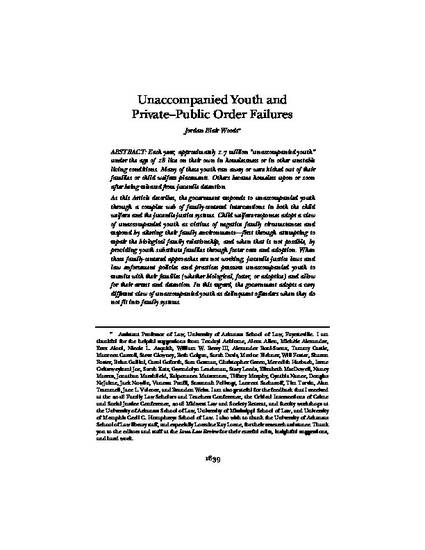
Article
Unaccompanied Youth and Private-Public Order Failures
Iowa Law Review
(2018)
Abstract
Each year, approximately 1.7 million “unaccompanied youth” under the age of 18 live on their own in homelessness or in other unstable living conditions. Many of these youth ran away or were kicked out of their families or child welfare placements. Others became homeless upon or soon after being released from juvenile detention.
As this Article describes, the government responds to unaccompanied youth through a complex web of family-centered interventions in both the child welfare and the juvenile justice systems. Child welfare responses adopt a view of unaccompanied youth as victims of negative family circumstances and respond by altering their family environments—first through attempting to repair the biological family relationship, and when that is not possible, by providing youth substitute families through foster care and adoption. When those family-centered approaches are not working, juvenile justice laws and law enforcement policies and practices pressure unaccompanied youth to reunite with their families (whether biological, foster, or adoptive) and allow for their arrest and detention. In this regard, the government adopts a very different view of unaccompanied youth as delinquent offenders when they do not fit into family systems.
This Article shows that unaccompanied youth whose needs are not served under family-centered child welfare responses are ultimately left vulnerable to entering a destructive cycle of homelessness and involvement in the juvenile and criminal justice systems. It further argues that the experiences of unaccompanied youth, and unaccompanied LGBTQ youth in particular, demonstrate the limits of the family-centered approach as a wholesale or comprehensive solution to the child welfare needs of adolescent youth. The shortcomings of this approach illustrate a need for a paradigm shift in child welfare law and policy (and relatedly, juvenile justice law and policy) that places greater emphasis on non-family-centered approaches to serve vulnerable youth in need of help from the state, especially late-adolescent youth. Under this new framework, child welfare law and policy responses would conceptualize the agency and autonomy of unaccompanied youth in positive and empowering terms, and provide greater space for support systems, skills, and resources outside of family systems to help them achieve self-reliance and self-actualization as adults.
Keywords
- criminal law,
- family law,
- child welfare,
- juvenile justice,
- law & sexuality,
- lgbt,
- homelessness,
- poverty
Disciplines
Publication Date
2018
Citation Information
Jordan Woods. "Unaccompanied Youth and Private-Public Order Failures" Iowa Law Review Vol. 103 (2018) p. 1639 Available at: http://works.bepress.com/jordan-woods/10/
